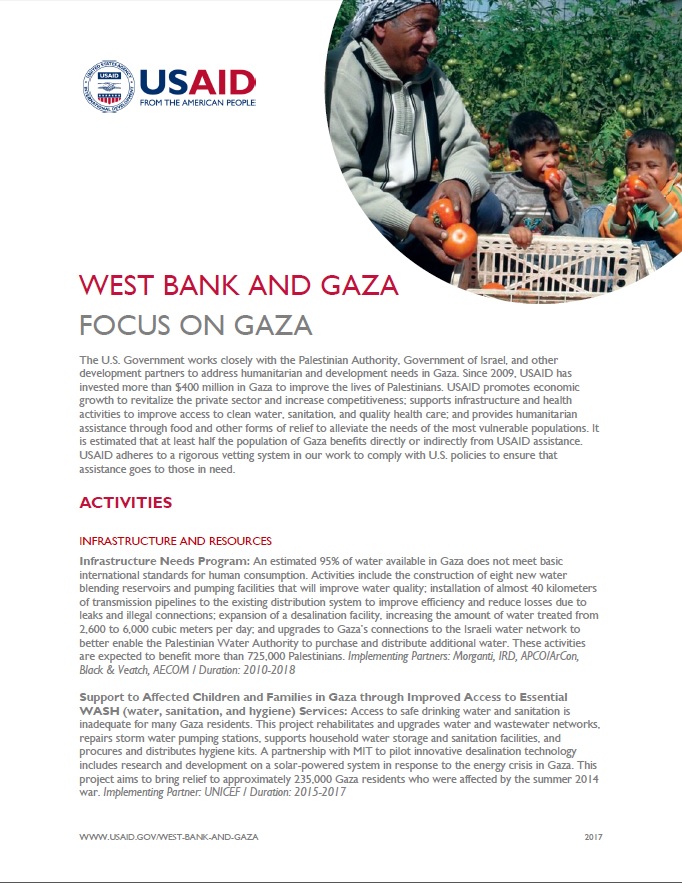Gaza Program Fact Sheet ![]() (pdf - 191k)
(pdf - 191k)
The U.S. Government works closely with the Palestinian Authority, Government of Israel, and other development partners to address humanitarian and development needs in Gaza. Since 2009, USAID has invested more than $400 million in Gaza to improve the lives of Palestinians. USAID promotes economic growth to revitalize the private sector and increase competitiveness; supports infrastructure and health activities to improve access to clean water, sanitation, and quality health care; and provides humanitarian assistance through food and other forms of relief to alleviate the needs of the most vulnerable populations. It is estimated that at least half the population of Gaza benefits directly or indirectly from USAID assistance. USAID adheres to a rigorous vetting system in our work to comply with U.S. policies to ensure that assistance goes to those in need.
ACTIVITIES
INFRASTRUCTURE AND RESOURCES
Infrastructure Needs Program: An estimated 95% of water available in Gaza does not meet basic international standards for human consumption. Activities include the construction of eight new water blending reservoirs and pumping facilities that will improve water quality; installation of almost 40 kilometers of transmission pipelines to the existing distribution system to improve efficiency and reduce losses due to leaks and illegal connections; expansion of a desalination facility, increasing the amount of water treated from 2,600 to 6,000 cubic meters per day; and upgrades to Gaza’s connections to the Israeli water network to better enable the Palestinian Water Authority to purchase and distribute additional water. These activities are expected to benefit more than 725,000 Palestinians.
Support to Affected Children and Families in Gaza through Improved Access to Essential WASH (water, sanitation, and hygiene) Services: Access to safe drinking water and sanitation is inadequate for many Gaza residents. This project rehabilitates and upgrades water and wastewater networks, repairs storm water pumping stations, supports household water storage and sanitation facilities, and procures and distributes hygiene kits. A partnership with MIT to pilot innovative desalination technology includes research and development on a solar-powered system in response to the energy crisis in Gaza. This project aims to bring relief to approximately 235,000 Gaza residents who were affected by the summer 2014 war.
Palestinian Community Infrastructure Development Program (PCID): Many Gaza residents lack access to potable water and adequate sanitation. This project complements other work in Gaza to increase access to water and sanitation by implementing small and medium-scale community infrastructure projects to address basic needs in rural and vulnerable Palestinian communities. PCID targets more than 230,000 residents with improved access to potable water and sanitation systems.
HEALTH, HUMANITARIAN ASSISTANCE, AND ECONOMIC GROWTH
Envision Gaza 2020: Tens of thousands of Gazans are in need of humanitarian assistance and employment opportunities. Envision Gaza 2020 aims to create a path for vulnerable populations to become more sustainable and self-reliant by providing humanitarian commodities and by increasing employment opportunities through short-term employment, paid internships, minor capital investments, and job training. The project’s goals are to provide at least 10,000 needy households with food and other items through an innovative e-voucher system and to create at least 10,000 employment opportunities through an advanced, intuitive online jobs portal.
Health Matters: The health care system in Gaza is in dire need of reform and better services. Health Matters improves emergency preparedness and response and improves access and availability of quality primary and secondary health care. The project works with NGOs and private providers in Gaza to upgrade the quality of mental and psychosocial support, enhance the nutritional status of women and children, improve rehabilitation services, and reduce the percentage of cases referred out of Gaza for specialty care. Health Matters currently benefits about 20,000 people in Gaza and is prepared to assist up to an additional 250,000 people in emergency and disaster response situations.
Assistance to Vulnerable Groups: In 2014, the UN estimated that 47% of the households in Gaza are food insecure. This project provides food assistance to 95,000 non-refugee beneficiaries in Gaza. The food support includes fortified wheat flour, vegetable oil, pulses, lentils, and salt. The project is especially beneficial to rural areas with fewer economic opportunities.
Compete: Many firms in Gaza suffer from a lack of expertise and resources. Compete facilitates the rapid expansion of critical sectors of the Palestinian economy by providing expertise to companies on how to maximize the value of their products. The project’s latest activities focus on Gaza’s agriculture, fishing, ICT, and textile sectors. The project’s goals include: upgrading 40 wells operated with solar energy; increasing the capacity of onshore fish farms from 240 to 1200 tons per year; increasing the production area of fresh herbs from 30 to 150 dunums; and creating 200 professional jobs and 1,000 seasonal jobs.








Comment
Make a general inquiry or suggest an improvement.